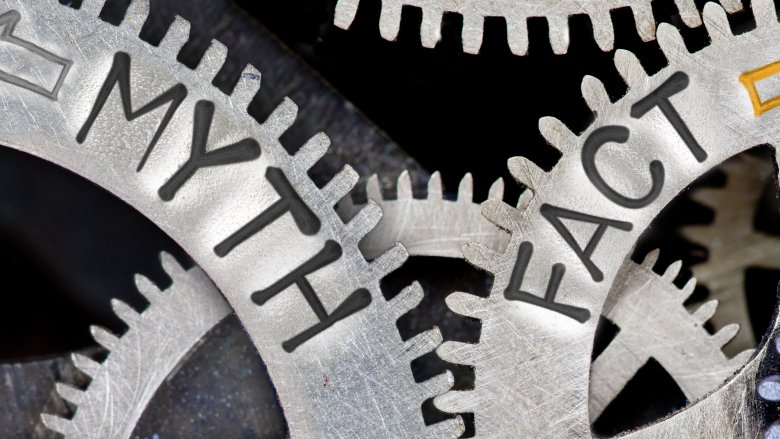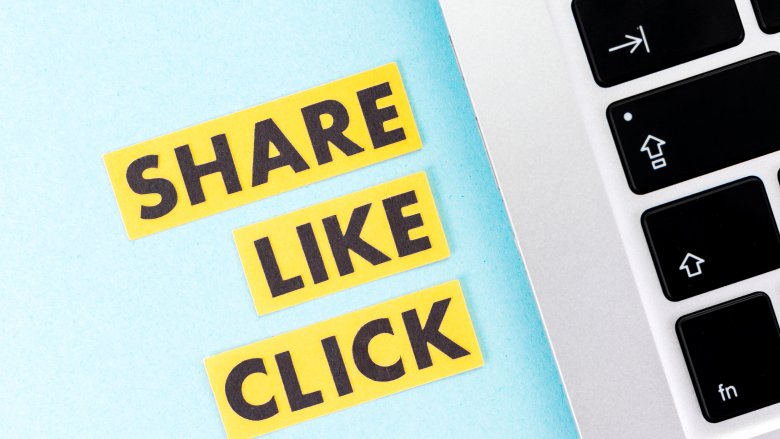Businesses Designed To Help You Lie
For centuries people have been telling the tale of George Washington and the cherry tree. It's about how America's first president once murdered a large plant and then confessed to it because he couldn't stand lying. To be honest, the story isn't super exciting, but it's still remarkable in two respects. First, it's an artfully simple way to equate truthfulness with greatness. Second, it's total horsepucky, which just proves how useful dishonesty is. Lying's so valuable, in fact, that whole businesses are devoted to it.
The wonderful whizzards of fraud
Drug tests can be nerve-racking, especially if you take drugs. To help alleviate pee test jitters, Puck Technology created the Whizzinator, a urine delivery system for men. Yep, just a fake ding-dong with fake urine. Equipped with a heater to approximate uric warmth, the device was marketed as "the ultimate solution for a drug testing device," according to the BBC. On top of that brazen brag, Puck Technology declared itself the "undisputed leader in synthetic urine" and further bragged that "the Whizzinator will let it flow again and again, anytime, anywhere you need it!" Heck, it even came in multiple flesh tones.
Obviously, the Whizzinator sounds perfect for penile duplicity. That's clearly what Carl Vitiello Jr. thought while trying to use one in 2013. But as one New Jersey news source told it, plans went awry when Vitiello accidentally soaked his pants in fake urine. In 2010, Floridian Paul Hanna got busted when a cop saw an extra sausage in Hanna's pants.
And then there's NFL running back Onterrio Smith. According to Vice, Smith fell afoul of law enforcement in 2005 after airport security found a Whizzinator in his baggage. That scandal brought national attention to the device, which awkwardly featured in congressional hearings on drug testing. In 2010, the Whizzinator's originators received criminal convictions for selling a drug test workaround. But the pants shenanigans didn't end there. In 2010, a California company resumed sales of the device, this time touting it as a romantic toy.
In case of emergency call 1-1-9
Remember when Sprite aired commercials telling you "image is nothing"? Well, if South Korea were a commercial, it would say the opposite of that. And instead of peddling liquid diabetes, it would sell people, or at least rent them out for social engagements. In fact, that already happens.
As noted by NPR, popularity and prosperity are paramount in South Korea. But like good looks and drug addictions, not everyone has them. In order to hide this disparity, Role Rental 1-1-9 provides counterfeit relationships in exchange for real money. The groundwork for such companies was laid in the 1990s when people started renting fake wedding guests as dates or to impress spouses-to-be. Because nothing says "forever" like lying on your wedding day.
Since then, the customer base has expanded to include people in search of phony friends, significant others, bosses, and even parents. Granted, if you're that desperate, there's a good chance you also lack people to impress in the first place. But you can probably rent those, too. Role Rental 1-1-9 boasts a catalog of 20,000 actors of various ages and applications. However, not everyone's eager to buy life's precious moments. Performance artist Maria Yoon told NPR, "Life is too short for you to make your neighbors happy. You just have to be happy yourself." That's a nice, if incomplete, sentiment. Life isn't lived in a vacuum, so others' opinions matter. It's more a question of whom to impress and how.
Faux-tographic evidence
Admittedly, renting a live actor to enhance your social cred might be overkill. Besides, you'd have to feign closeness with that actor in front of people you know, which sounds difficult. So maybe it's better to fake friends photographically. Luckily, Japan has an option for that. In 2017, the creepily named company Family Romance rolled out its Real Appeal picture service. According to The Independent, for 8,000 yen (or about $70), you can photograph an attractive person pretending to like you. You're allowed to hire as many consorts as you can afford, and they'll meet you at the venue of your choice. From there you can stage all the fun times you never had and post the photos on social media.
Real Appeal does come with some drawbacks, however. Family Romance makes it clear that customers are on the hook for any travel- or food-related expenses. Clients also have to set aside at least two hours for a picture session, time that could be spent napping or making actual friends. Then there's the question of why Real Appeal appeals to people at all. Family Romance suggests some customers frazzle their ex-lovers by posing with fake mates. That sounds immature at best and malicious at worst. The Independent offers an even gloomier take, observing that excessive social media use correlates with perceived isolation. It's possible that Real Appeal is little more than a psychological crutch for those who can't deal with their sense of loneliness.
Freedom of assembly line
Nothing's more democratic than allowing like-minded individuals to rally in support of a political cause. In a similar vein, few things are more American than recruiting random strangers to stage a protest. And with the help of Crowds on Demand, businesses and individuals can do just that. The company relies on simple bandwagon logic: make something look popular enough and the masses will flock behind it like good little sheep. It's sort of like how Vladimir Lenin bolstered Communism by calling his supporters Bolsheviks ("the majority") despite them often being a political minority. (See? Super American.) It's crucial to mention that Crowds on Demand doesn't play political favorites — if you pay, they show up.
As founder Adam Swart explained to CNN, "The company started as a way for up-and-coming celebrities to get more attention." This entailed hiring bogus bodyguards and poser paparazzi to create a sense of importance around not-so-famous people. Businesses and politicians saw the value in such a contrivance and proceeded to throw money at it, causing an ironically organic increase in artificial crowds. According to Swart, Crowds on Demand "more than doubles" annually, though it seems just as likely that he himself placed crowd orders to look more successful. In any event, phony fans have real appeal. The Atlantic observed that Crowds on Demand has served everyone from disgraced congressman Anthony Weiner to a venture capitalist determined to turn California into six separate states.
Love at first sleight
Television, movies, and meddling mothers tell us that anyone worth liking is worth loving. So if you're not in a serious relationship by some magical age, then you've obviously failed at life forever. This often results in an unwanted cavalcade of dating tips and romantic comedy wisdom from people bent on nagging you to happiness. Long ago you could only get those busybodies off your back by getting married or suffering an untimely death. But now services like Invisible Boyfriend exist.
Created by Matt Homann and managed by the company CrowdSource, Invisible Boyfriend is neither invisible nor a boyfriend. As noted by Riverfront Times contributor Lindsay Toler, flesh-and-bone humans supply clients with texts, photos, and personal messages that cater to a requested personality type. The Invisible Boyfriend website stresses that these aren't just uninspired workers passing the time, but a group of creative writers who shoot for authenticity. This can lead to some rather imaginative exchanges.
A piece by The New Yorker shared sample texts from Invisible Boyfriend, and some teetered dangerously on the edge of madness. Such gems include: "You drank a lot of wine last night, but I don't judge," and "Tonight, how about I rub your belly while you watch 'Dawson's Creek'?" But easily the most exciting of these messages is "It turns me on to watch you eat cheese." And for just $15 or $25 a month, all that cheesy goodness can be yours.
Vice, vice, baby
Immigration concerns have long been political sore spot. Some people want more open borders while others argue the next Tony Montana is a border wall away. Wherever you fall on that issue, hopefully everyone can agree that the Chinese excel at immigration fraud.
Every year, tens of thousands of Chinese women are believed to enter the U.S. for the sole purpose of planting babies on American soil. The practice isn't expressly forbidden, but according to USA Today, the way these women go about it is. Under the dubious tutelage of Precious Beauty Baby and hundreds of firms just like it, expectant Chinese mothers lie on visa applications to boost their approval chances. So rather than reveal plans to unload their uteri in America, they straight-up invent reasons for visiting, which can get them travel-banned.
For many the risk is well worth it. Chinese babies birthed in America can declare U.S. citizenship once they turn 18. And those who do gain legal leeway to bring over their parents at age 21. Talk about playing the long game. It makes sense, though, since China isn't exactly known for amenities like political freedom or clean air. In America, you can have at least half of those things. Women who successfully fib their way into the U.S. can look forward to staying at so-called birthing hotels, according to the LA Times. Those hotels have been raided and shut down in the past, accused of fraud and other illegalities, but many continue to operate.
Hire education
For time immemorial people have sought recognition for work they didn't do. Alexander Graham Bell stole his idea for the telephone. Glug the Neanderthal plagiarized the first cave art. (Probably.) And in the internet age, countless students pay professionals to do schoolwork for them. Whereas old-school cheaters settled for $10 essays by the class brainiac, younger generations turn to unscrupulous companies. A 2016 article by the BBC explained that students with writing assignments and money to burn can find commercial essay firms online. And according to The Atlantic, lazy learners in web courses can rent student impersonators to take their classes for them.
You might be wondering how would-be cheaters know they themselves aren't getting cheated. After all, these companies only make sense to use if they're staffed by quality scholars. And wouldn't those brilliant brains find good jobs in legitimate fields? Perhaps, but the BBC met a liar for hire who offered a different perspective.
Using the alias Marek Jezek, the professional cheat artist described his career path as "an emotional retribution for a wrong." Despite holding impressive degrees, he couldn't seem to land work. Concluding he was the victim of racial prejudice, the jaded Jezek turned to academic subterfuge. From then on he made his living writing papers and PhD dissertations for aspiring degree-holders. So there you have it. If you stay in school and make good grades, you too can become an academic supervillain.
Keepin' it classless
Paying someone to complete specific assignments or take select classes is ineffably lazy. Yet it still leaves the possibility for students to do less taxing coursework on their own. However, to some sloths, even that's too much effort. For these more extreme cases there's an even easier shortcut: degree mills. According to a 2010 report by CNN, degree mills sell over 100,000 sham diplomas annually in the U.S. Imitation degrees cost about $1,000, though advanced certifications run for far more. Regardless, they're pretty darn economical compared to real college. And when you think about it, it's really society that pays, anyway.
Generally, degree mills hide behind a veneer of authentic-looking websites and fancy stationery. So while customers know they're buying fool's gold, employers sometimes fall for the gleam. This results in a bevy of unvetted people, including literal nuclear engineers and doctors, according to CNN. And you just know that eventually some surgeon with credentials from Quack U will get to carve up defenseless patients.
It may comfort you to know that diploma mills do have a few hurdles to jump. Some of them ask you to take a week-long course. And certain certifications require a whole month of light studying. At the other end of the spectrum are institutions that just want a hefty payment and proof of past "qualifications" in a particular subject. The BBC discovered just how strict such requirements are when it successfully purchased an MBA for a dog.
Paid fake-cations
The funny thing about finding employment is that most people who land a job want desperately not to do it. Days off feel like paradise, and workweeks resemble perdition. So any opportunity to play hooky receives an open-armed welcome. Over the years, business-minded folk have come to exploit this phenomenon, doctoring false pretexts for missing work.
Back in 2007, NBC reported on a company called Vision Matters. While it sounds like an eye charity, Vision Matters was actually a one-stop shop for work-dodgers. It allowed people to choose from a variety of doctor's notes, jury summons, and even funeral service programs. And lest someone question how your grandma died three different times, Vision Matters would heighten the realism with sappy poems and pallbearer pictures.
Vision Matters is just one drop in an ocean of workplace deception. As ABC 4 News observed, the web is awash with professional excuse-makers, like BestFakeDoctorsNotes.net. The bogus notes were pretty realistic, and if an impostor note raised suspicion, BestFakeDoctorsNotes.net had a backup plan. The site had a call-back service so employers who dialed fake hospital numbers would hear automated messages. It goes without saying that the true test of a fake note is fooling a company that makes them. But those places probably aren't big on work attendance.
Revisionist work history
Imagine you had a great education but then got arrested for something creepy, like sniffing people's shins on the subway. Or instead of immediately seeking work post-graduation, you spent 10 years playing Duck Hunt and eating Cheetos. How would you find work? Well, Career Excuse has an answer.
Customers of Career Excuse can look forward to bombarding prospective employers with phantom work histories, bogus bosses, and endorsements from imaginary coworkers. Replete with 200 faux firms and a crack staff of quality dissemblers, Career Excuse lets you lie as far as your wallet can take you. According to Vice, features include beguiling LinkedIn profiles, deceptive Google Maps pages, and actors who sing your unearned praises over the phone.
Those willing to spend the dough gain access to Career Excuse Pro, a souped-up version of the service that includes shell companies with legal standing. With resources like that, who needs college? (Who even needs fake college?) Career Excuse is basically a cheat code to life for shameless people. But to be (unnecessarily) fair to the company, Career Excuses does place limits on how far it'll go.
Attempts to snag jobs as lawyers or doctors get stonewalled, since that could really harm people. Screwing honest applicants out of work, however, is apparently fine. Founder William Schmidt doesn't see a problem. As Schmidt framed it for CNN, Career Excuse gives second chances to people in need of them. Too bad that also means taking first chances away from others.










